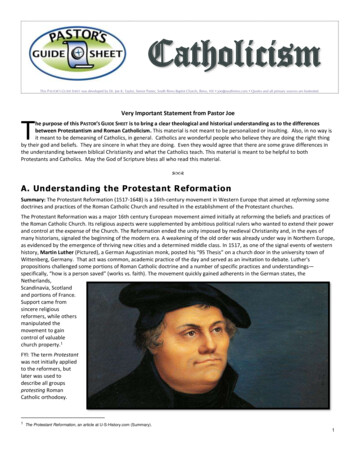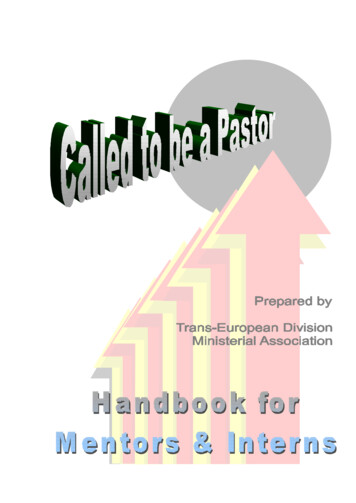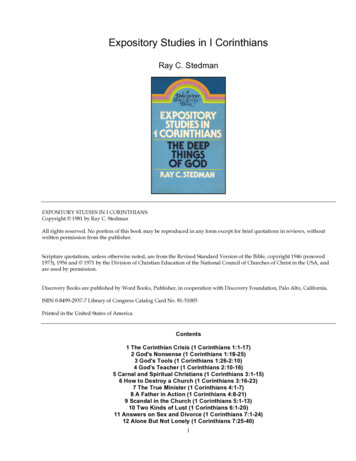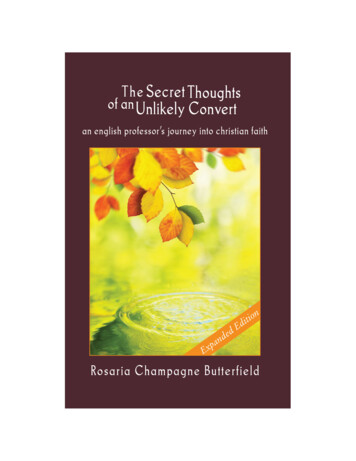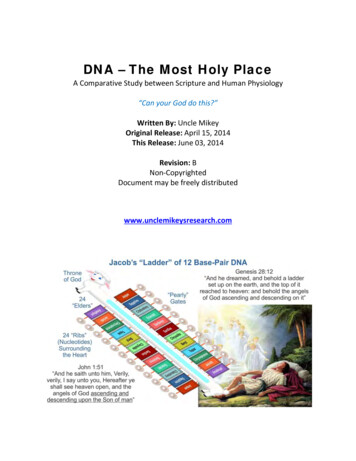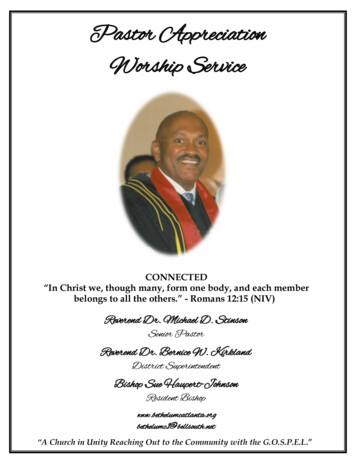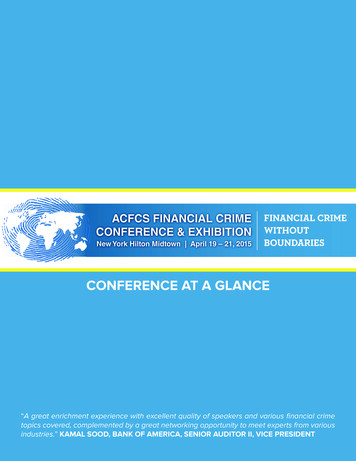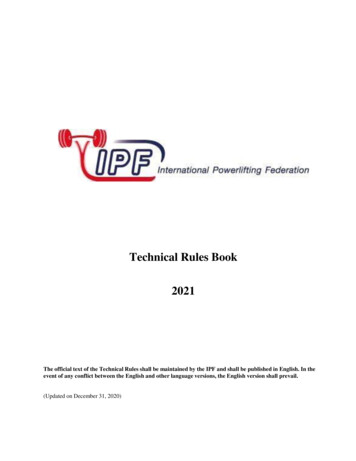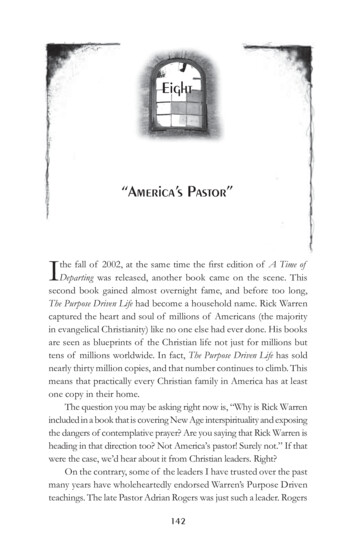
Transcription
Eight“America’s Pastor”Ithe fall of 2002, at the same time the first edition of A Time ofDeparting was released, another book came on the scene. Thissecond book gained almost overnight fame, and before too long,The Purpose Driven Life had become a household name. Rick Warrencaptured the heart and soul of millions of Americans (the majorityin evangelical Christianity) like no one else had ever done. His booksare seen as blueprints of the Christian life not just for millions buttens of millions worldwide. In fact, The Purpose Driven Life has soldnearly thirty million copies, and that number continues to climb. Thismeans that practically every Christian family in America has at leastone copy in their home.The question you may be asking right now is, “Why is Rick Warrenincluded in a book that is covering New Age interspirituality and exposingthe dangers of contemplative prayer? Are you saying that Rick Warren isheading in that direction too? Not America’s pastor! Surely not.” If thatwere the case, we’d hear about it from Christian leaders. Right?On the contrary, some of the leaders I have trusted over the pastmany years have wholeheartedly endorsed Warren’s Purpose Driventeachings. The late Pastor Adrian Rogers was just such a leader. Rogers142
“America’s Pastor”143wrote of The Purpose Driven Church (Warren’s first book) in the mostvibrant terms. Of it he said, “This book is on the must-read list forevery pastor.”1And Adrian Rogers isn’t the only one. In fact, it appears that mostChristian leaders support Warren, with only a small number who donot. And this support has cut across nearly every denominational andreligious partition. From Southern Baptist (Warren’s own denomination) to Pentecostal to Lutheran to Jewish to Catholic, countless leaders and pastors have given their unwavering support and endorsementto Warren and his Purpose Driven program.In my book, I have tried to lay out a concise and well-documented explanation of contemplative prayer—its history, itsmake-up, and its technique. I have also illustrated with one exampleafter another just how widespread and pervasive contemplativespirituality really is. If indeed Rick Warren is promoting contemplative prayer, as I believe he is, this guarantees that contemplativeprayer will be promoted on an enormous scale. Through RickWarren, Richard Foster’s vision could enter fully into mainstreamevangelicalism both in North America and around the world; andwith the unprecedented following and support Warren has gained, wecould be heading towards a crisis in the church that might possiblylead to the falling away that the Apostle Paul warns about.Contemplative Prayer—“a Hot Topic”Rick Warren believes that his “Purpose Driven paradigm” is an essential element and the heartbeat of the church. Of it, he says:Personal computers have brand names. But inside everypc is an Intel chip and an operating system, Windows. The Purpose Driven paradigm is the Intel chip for the21st-century church and the Windows system of the21st-century church.2Warren also believes Purpose Driven has helped to put evangelicalChristianity on a path that will lead to a second “reformation” and agreat spiritual awakening:
144A Time of DepartingI believe that we are possibly on the verge of a newreformation in Christianity and another Great Awakeningin our nation The signs are everywhere, including thepopularity of this book.3In an interview, Warren stated:I’m looking for a second reformation. The firstreformation of the church 500 years ago was aboutbeliefs. This one is going to be about behavior. The firstone was about creeds. This one is going to be aboutdeeds. It is not going to be about what does the churchbelieve, but about what is the church doing.4Many who adhere to the Purpose Driven movement see great hopein its message. With Warren’s proposed global P.E.A.C.E. Plan, thathope extends far beyond the borders of Christianity, and Warren isseen as someone who can solve the major dilemmas the world nowfaces! Yet the danger is that this agenda could serve as a platform forpromoting a global spirituality that compromises the Gospel.In February of 2003, my publisher sent a copy of A Time of Departing to Rick Warren with the hopes of alerting him to the dangers ofcontemplative spirituality. At the time, we knew nothing about how farWarren had already traveled down that road. We had actually hopedto warn him of what I saw sweeping the church. A couple of weeksafter sending the book, he sent a card, which read:Just a note to say thanks for the copy of A Time ofDeparting by Ray Yungen. It definitely will be a usefuladdition to my personal library and resource in mystudies. I agree this is a hot topic. Sincerely, Rick WarrenWhile his response was vague, it seemed clear by his note hehad recognized contemplative spirituality as an item of relevancein Christendom today. The question then was, on which side of thefence was he standing?
“America’s Pastor”145As I have carefully shown in this book, contemplative spiritualityis a belief system that is a bridge to interspirituality and thus a denialof the message of the Cross. And we know by Scripture that wecannot serve both man and God. Rick Warren is either for or againstcontemplative prayer. Which one is it? It cannot be both.We can begin to find the answer to this question by turning toWarren’s first book The Purpose Driven Church. In that book, Warrenpraises a number of parachurch movements he believes God has“raised up” to remedy a “neglected purpose” in Christianity. One ofthese he mentions is the spiritual formation movement, which promotescontemplative prayer through the “Spiritual Disciplines.” Warrennames Richard Foster and Dallas Willard as leaders of this movement.5I believe I can document that Warren does indeed embrace thespiritual formation movement, of which he writes that this movement has a “valid message for the church”6 and has “given the bodyof Christ a wake-up call.”7 What this means is that Warren, leader ofthis “New Reformation,” has landed on the side of the contemplativeprayer (i.e., spiritual formation) movement. In order to prove this tobe true, it is essential to examine Warren and his ministry. In so doing, you may also come to the conclusion, as I have, that the PurposeDriven paradigm could very well be providing an avenue not for anew reformation and spiritual awakening from God but rather for adescent into spiritual apostasy.Purpose Driven: Mystics, Monks, and Breath PrayersThe vast majority of people who read Warren’s books feel hisapproach to Christianity is articulate and refreshing. Furthermore,they see some of his statements, such as the one below, as proofbeyond measure that he is a staunch defender of the faith:Every human being was created by God, but noteveryone is a child of God. The only way to get intoGod’s family is by being born again into it. But there isone condition: faith in Jesus. The Bible says, “You are allchildren of God through faith in Christ Jesus.”8
146A Time of DepartingHowever, a growing number of believers see Warren in a verydifferent light, as someone who has sold out Christianity by usinghigh-tech marketing methods and a watered-down gospel—one thatde-emphasizes sin and repentance and promotes sensual approachesto worship and secular psychology-based counseling programs. Whilethese issues may be worth discussing and debating, this is not thefocus of my critique in this book.Most likely, many of Warren’s admirers might feel that what Iam saying about America’s Pastor is a sort of misguided heroism andthat I am implying that I, and others like me, are more informed anddiscerning than multitudes of pastors who embrace Warren. Suchadmirers might see me as one who is giving a black eye to the veryChristianity I claim to defend. What do I have to say to these charges?Simply put, my objective is not to attack individuals such as Rick Warren but rather to reveal what certain practices (and the belief systemthat enfolds them) entail and why Christians should not engage inthem. Is this controversial? Yes! However, this is one controversialdebate that is vital to the spiritual well-being of millions of people.I draw your attention now to a section in The Purpose Driven Lifeunder Day 11, “Becoming Best Friends with God.” In this section,Warren begins by telling readers that more than anything else, Godwants to be our friend, that “we were made to live in God’s continualpresence,”9 and that “we can now approach God anytime,”10 but headds there are “secrets”11 to having a friendship with God. One ofthose secrets he refers to is a form of contemplative spirituality called“breath prayers.”12 He says that a relationship with God will neverhappen by just attending church and having a daily quiet time. Hethen offers an example of someone who learned this secret and hadan intimate relationship with God. This person was a Carmelite monknamed Brother Lawrence.The fact that Brother Lawrence was in the Carmelite ordermeans his spiritual practices were derived from or heavily influencedby Teresa of Avila who reformed that order in the previous century.In a book titled Christian Mystics, Professor Ursula King makes thestartling revelation that:
“America’s Pastor”147[G]iven her [Teresa of Avila] partly Jewish background, herthinking was also affected by Jewish Kabbalistic mysticism,elements of which can be detected in her writings.13Brother Lawrence is often quoted by contemplative authors for hishabit of what he called “practicing the presence of God.”14 But what wasthe actual nature of this presence? Was it something that would reflectthe true character of God? I find the following account from a devoutadvocate of Brother Lawrence both questionable and disturbing:It is said of Brother Lawrence that when something hadtaken his mind away from love’s presence he would receive“a reminder from God” that so moved his soul that he“cried out, singing and dancing violently like a mad man.”You will note that the reminders came from God and werenot his own doing.15Brother Lawrence says that secret conversations with God mustbe “repeat[ed] often in the day,”16 and “for the right practice of it,the heart must be empty of all other things.”17 He speaks of thetrouble of wandering thoughts and says that the habit of practicingthe presence of God is the “one remedy”18 and the “best and easiestmethod”19 he knows to dissolve distractions.Rick Warren has not only favorably introduced this monk to hisreaders and called his ideas “helpful”20 but has sandwiched between hiscomments on Brother Lawrence an unusual rendering of Ephesians4:6 from the New Century Version concerning God that reads, “Herules everything and is everywhere and is in everything.”21 However, Warrenneglects to rectify this misleading translation and alert the reader tothe fact that Paul is speaking here of the Church body as uniquelyunited in Christ by one single faith under one single God as is clearby what immediately precedes the verse in question:There is one body and one Spirit one Lord, one faith,one baptism; one God and Father of all. (Ephesians4:4-6a)
148A Time of DepartingAnd lest anyone should think Paul is speaking in terms of an all-inclusive God-is-in-everybody religion, he only says this after making oneof the most concise presentations of the Gospel recorded in Scripture:For by grace you have been saved through faith, and thatnot of yourselves; it is the gift of God, not of works,lest anyone should boast But now in Christ Jesus youwho once were far off have been brought near by theblood of Christ. (Ephesians 2: 8,9,13)Without Warren giving any explanation to the verse he quotes, theimplication is that God is in all creation, including all persons. Many reading The Purpose Driven Life may very well take this to mean that God isin all. Former New Age follower, Warren Smith, in his book Deceived onPurpose: The New Age Implications of the Purpose Driven Church, expounds:Rick Warren’s implication that God is “in” everyperson is at the very heart of all New Age teaching.The Bible does not teach this. The New Century Versionthat Rick Warren quotes is dangerously mistaken in itstranslation of Ephesians 4:6. New Age teachers withtheir New Spirituality are trying to co-opt this scriptureto make it apply to the whole human race.22Shalem Institute, founded by Tilden Edwards and located in Washington, DC, sees Brother Lawrence as someone whose contemplationincludes the belief that God is in everything:Christian contemplation means finding God in allthings and all things in God. Brother Lawrence, the17th century Carmelite friar, called it “the loving gazethat finds God everywhere.”23Rick Warren has taken Brother Lawrence’s advice of repeating“little internal adorations” throughout the day a step further and tellshis readers that “practicing the presence of God” can be accomplishedthrough breath prayers. Warren states:
“America’s Pastor”149The Bible tells us to “pray all the time.” How is it possibleto do this? One way is to use “breath prayers” throughoutthe day, as many Christians have done for centuries. Youchoose a brief sentence or a simple phrase that can berepeated to Jesus in one breath. (emphasis mine)24Warren then advises readers to use visual reminders throughoutthe day and gives an example of others who practice breath prayers—Benedictine monks, known for their contemplative spirituality andinterspirituality. According to Warren, this breath prayer that themonks practiced (and now we should practice) involves taking a “simplephrase” such as “I belong to you” or “You are my God” and “Prayit as often as possible.” (emphasis mine)25British metaphysical author Carolyn Reynolds, in her bookSpiritual Fitness, defines meditation simply as “repeated sounds orphrases.”26 That is exactly what Warren is promoting. He assuresreaders, “Practicing the presence of God is a skill, a habit you candevelop.”27 The key word here is “skill,” which reflects Richard Foster’sinfluence that Christians need to be trained in order to interact withGod in any profound way. But it is the nature of this method thatbetrays the danger of the contemplative approach.In Foster’s book, Prayer: Finding the Heart’s True Home, Foster encourages readers to “bind the mind” with “breath prayers,”28 quotingTheophane the Recluse and making reference to Brother Lawrence,calling him a practitioner of this type of prayer. Very likely, this iswhere Warren picked this up.I believe this is a question that needs to be asked, “Is breath prayera valid practice?” In Sonia Choquette’s book on psychic development,Your Heart’s Desire, she says, “All of us need to take the time to expandour mental awareness in order to hear inner guidance.”29 The way shesuggests doing this is through the same principle as breath prayer.One repeats, “I am calm” over and over again.When a word or phrase is repeated over and over, after just a fewrepetitions, those words lose their meaning and become just sounds.
150A Time of DepartingHave you ever tried repeating a word over and over again? After threeor four times, the word may begin to lose its meaning, and if thisrepeating of words were continued, normal thought processes could beblocked, making it possible to enter an altered state of consciousnessbecause of a hypnotic effect that begins to take place. It really makesno difference whether the repeated words are “You are my God” or “Iam calm,” the results are the same. So, if you use Warren’s method orthe occult method, the use of a mantra will take you to the same place.What Warren is teaching is a derivative of The Cloud of Unknowing,an ancient primer on contemplative prayer, written by an anonymousmonk. Contemplative priest, Ken Kaisch, teaches his students thismethod of prayer found in Brother Lawrence’s writings and describeswhat the term “presence” means:You will be gradually able to tune into God’s presence you will have a sense of slow, vibrant, deep energysurrounding you Let yourself flow with this energy, itis the Presence of our Lord As you continue to dwellin the Presence, the intensity will grow. It is extremelypleasurable to experience.30Warren not only promotes breath prayers on Day 11 in ThePurpose Driven Life but also on Day 38, where he tells readers howto become “world-class Christian[s]” through the “practice [of] breath prayers.”31 In addition to these two references, there are fourreferences to using breath prayers on Warren’s pastors.com website,which reaches thousands of pastors throughout the world. And on themain Purpose Driven website, Warren again promotes this practice inan article titled “Purpose Driven Life: Worship That Pleases God.”32Evidence That Cannot Be IgnoredSkeptics, at this point, may say, “So Rick Warren promotesbreath prayers. That hardly qualifies him as a contemplative advocate.” Well, let’s say for a moment that this is true—that promotingbreath prayers is not enough solid evidence. Is there any other indication that Warren aligns with contemplative spirituality? In truth, there
“America’s Pastor”151is ample evidence to prove this vital point.Through Rick Warren’s pastors.com website, he is able to communicate to over 150,000 pastors and church leaders around the world.In taking a close look at this website, as well as the weekly e-newsletterthat goes out via email to these pastors, it doesn’t take much effortto find that Warren is promoting Richard Foster, Brennan Manning,Henri Nouwen, and Thomas Merton. These and other contemplativesare favorably endorsed and promoted repeatedly.While most of the examples I give are directly from Rick Warrenhimself, my first example is an article written by Saddleback’s pastorof spiritual maturity, Lance Witt. In his article (found on Warren’swebsite), titled “Enjoying God’s Presence in Solitude,” Witt says, “Wewere created with a need for solitude,” and adds:Your life is full of pressures, distractions and fast-pacedliving. According to Thomas Merton, it is reflection andwonder (solitude) that scoops these invaders out of yourlife. Through solitude, there is finally room in your soulto meet God and for him to do the work in you that Helongs to do.33Witt says that “Solitude creates capacity for God,” and “The goalof solitude is not so much to unplug from my crazy world, as it is tochange frequencies.” Witt then quotes Richard Foster as someonewho knows how to change frequencies:Solitude doesn’t give us the power to win the rat race,but to ignore it altogether.34On the same website, Rick Warren refers favorably to a booktitled Sacred Pathways by his “friend” Gary Thomas. Of the book,Warren says:Gary has spoken at Saddleback, and I think highly of hiswork he tells them [readers] how they can make themost of their spiritual journeys. He places an emphasis
152A Time of Departingon practical spiritual exercises.35What are these “practical spiritual exercises” Warren is speakingof from Thomas’ book? In Sacred Pathways, Thomas lists different wayspeople can draw near to God incorporating contemplative prayer. Ina section titled “Centering Prayer,” he explains:It is particularly difficult to describe this type of prayer inwriting, as it is best taught in person. In general however,centering prayer works like this: Choose a word (Jesus orFather, for example) as a focus for contemplative prayer.Repeat the word silently in your mind for a set amountof time (say, twenty minutes) until your heart seemsto be repeating the word by itself, just as naturally andinvoluntarily as breathing.36Does this sound familiar? There’s no difference between it andEastern-style meditation or the experience Thomas Merton taught.In essence, Sacred Pathways is a manual for mantra meditation, yetWarren believes we can find ways to “draw near to God” through thisbook.37 How many thousands of pastors who read Warren’s newsletters might see his avid promotion of Sacred Pathways and buy a copy ofit? If they do, they will find that Thomas has an affinity for the writings of Annie Dillard, who also promotes contemplative spirituality.Warren’s promotion and endorsement of contemplatives doesn’t endwith Brother Lawrence, Thomas Merton, Richard Foster, Brennan Manning, and Gary Thomas. In the September 3, 2003 issue of Warren’s weeklye-newsletter to pastors, under his “Book Look” section, he listed TriciaRhodes’ book The Soul at Rest: A Journey into Contemplative Prayer and said:This book is a quiet-time companion for those whohunger for a greater intimacy with God. It offers fresh insightinto little understood aspects of prayer and introduces astep-by-step journey of learning contemplative prayer.(emphasis mine) 38A few months after this endorsement appeared on his website,
“America’s Pastor”153another mention of Rhodes was made on his weekly communication to pastors around the world, referring to Rhodes as “one of ourfavorite authors on contemplative prayer.”39This “favorite author” of Rick Warren describes a deep-breathingexercise in which the practitioner is to breathe out the bad and breathein the good, another example of the mantric methods used by mysticsin many world religions. Listen to Rhodes give instruction on how toprepare for prayer time:Take deep breaths, concentrating on relaxing your body.Establish a slow, rhythmic pattern. Breathe in God’speace, and breathe out your stresses, distractions, andfears. Breathe in God’s love, forgiveness, and compassion,and breathe out your sins, failures, and frustrations. Makeevery effort to “stop the flow of talking going on withinyou—to slow it down until it comes to a halt.”40I don’t remember ever reading in Scripture that I could partakeof God’s love by physically breathing it in or could rid myself of sinby breathing it out. Interestingly, Rhodes also quotes Morton Kelseyin this passage. You will recall Morton Kelsey, whom I discussed inchapter three, said:You can find most of the New Age practices in thedepth of Christianity I believe that the Holy Onelives in every soul.41Rhodes shows her affinity to contemplative prayer when shestates:Contemplative Prayer penetrates our heart of hearts,probing the deepest rooms of our interior soul. It leavesno stone unturned, no darkness unlit. It is wonderfuland painful and through it He changes us into Hislikeness.42
154A Time of DepartingRhodes encourages readers to use the Jesus Prayer in which thename of Jesus is focused on and repeated.* She also says what somany other contemplatives have said in their discontent with simplefaith and their disillusionment with the power of the Word of God:“Reading, studying or memorizing God’s Word will only take us so farin our quest for spiritual growth.”43 This is my point—contemplativesteach that faith in Christ and dependence on His Word is just notenough—we need a trance-like mystical experience as well.The pastors.com website is saturated with favorable comments,endorsements, and promotions of many contemplatives. On twoseparate occasions on the website, Warren makes reference to a bookhis wife, Kay, recommends:My wife, Kay, recommends this book: “It’s a shortbook, but it hits at the heart of the minister. It mentionsthe struggles common to those of us in ministry: thetemptation to be relevant, spectacular and powerful. Ihighlighted almost every word!” (emphasis mine)44The book Kay Warren recommends is In the Name of Jesus byHenri Nouwen. Nouwen devotes an entire chapter of that book tocontemplative prayer saying:Through the discipline of contemplative prayer, Christianleaders have to learn to listen to the voice of love . ForChristian leadership to be truly fruitful in the future, amovement from the moral to the mystical is required.45Anyone who knows something about the Warrens’ backgroundshould not be surprised by their promotion of Nouwen. Rick Warren is a graduate of the Robert H. Schuller Institute for SuccessfulChurch Leadership. Schuller himself emphasized the impact thatNouwen had on his school:*Technically, the Jesus Prayer is: Jesus Christ, Son of God, have mercy on me, asinner, but it is often shortened to just the word Jesus.
“America’s Pastor”155All of our students have to watch and listen to HenriNouwen. I keep interrupting and stopping the videomachine, telling them to notice how he uses his hands,to look at the twinkle in his eye, to see how he connectshis eye with the eye of the listener, to be aware of thewords he uses—all positives, no negatives.46The Warrens took Schuller’s word for it with regard to HenriNouwen. It’s no wonder: The Warren’s were greatly impacted bySchuller, according to a Christianity Today article, which quotes KayWarren as saying, “He [Schuller] had a profound influence on Rick.”47Rick Warren and the Emerging ChurchThe emerging church movement, which I will discuss further inthe next chapter, has gained the support of many Christian leaders. Rick Warren is one of those leaders who has actually helped tolaunch the movement. In Dan Kimball’s popular book, The EmergingChurch, Rick Warren wrote the foreword and said:This book is a wonderful, detailed example of what apurpose-driven church can look like in a postmodernworld. Dan’s book explains how to do it [reach an“emerging generation”] with the cultural-creatives whothink and feel in postmodern terms. You need to payattention to him [Kimball] because times are changing.48Kimball’s book describes different methods to reach this generation,including the use of “practicing silence, and lectio divina [a form ofcontemplative prayer].”49 Kimball reinforces his promotion of thesilence on his “Vintage Faith” website in an article he wrote titled“A-Maze-ing Prayer,” which promotes the use of the labyrinth as away of “Meeting God in the middle.”50The labyrinth (discussed more in the next chapter), used in ancientdays, is a maze-like structure, which was originally designed to connect with God mystically. As participants walk through the labyrinth(sometimes called a prayer walk or prayer path), chanting words or
156A Time of Departingphrases (centering down), the idea is that by the time they have centeredtheir souls, they will reach the center of the labyrinth.Dan Kimball expresses his admiration for the labyrinth, saying:Meditative prayer like that we experienced in the labyrinthresonates with hearts of emerging generations. If wehad the room, we would set up a permanent labyrinthto promote deeper prayer.51In the back of The Emerging Church, under the recommended resources section, Kimball lists several books written by contemplatives.Some of these include Sacred Pathways by Gary Thomas, Renovation ofthe Heart by Dallas Willard, Messy Spirituality by Mike Yaconelli, In theName of Jesus by Henri Nouwen, Book of Uncommon Prayer by SteveCase, and Four Views of the Church in Postmodern Culture by LeonardSweet. All of these authors share one thing in common—the beliefthat we need the silence to draw close to God, and that silence is reachedthrough contemplative prayer.Not only did Rick Warren write the foreword to Kimball’s book,but, in random spots throughout the book, he has written side-barcommentaries—seventeen of them to be exact. Of his commentaries,only one was negative and that was over a minor point. Nowhere inthe book is there any indication that Warren was not in full supportof Kimball’s views. Warren made comments such as: “This book is a wonderful detailed example ”52“Thank you so much for sharing your background, Dan Go for it.”53“This is so important!”54“An outstanding chapter, Dan!”55The question must be asked, is Rick Warren promoting andendorsing the emerging church movement? This is a valid questionconsidering the fact that the emerging church movement is immersedin contemplative spirituality and other metaphysical practices. Certainly, by writing the foreword to the emerging church signature book,
“America’s Pastor”157it would be safe to assume the answer is yes!We can confirm this answer by taking another look at Warren’sweekly e-newsletter that goes out to thousands of pastors around theworld. In the July 6th, 2005 issue, he devoted the issue to the emerging church movement, including his own feature article titled “Sharing Eternal Truth With an Ever-Emerging Culture.” One of therecommended links in that issue was to an organization called, TheOoze, where lies a hub of articles, books, and links for emerging andcontemplative spirituality. Spencer Burke, the organization’s director,features his own book Making Sense of the Church on The Ooze website.In that book, Burke states:I was struck by the incredible wisdom that could befound apart from the “approved” evangelical readinglist. A Trappist monk, [Thomas] Merton gave me a newappreciation for the meaning of community. His NewMan and New Seeds of Contemplation touched my heart inways other religious books had not. Not long afterwardmy thinking was stretched again, this time by Thich NhatHanh—a Buddhist monk Hanh’s Living Buddha, LivingChrist gave me insight into Jesus from an Eastern perspective.(emphasis mine)56This is just one quote that is indicative of the mindset that permeates The Ooze website. Why would Warren list that as a recommendedsite if he were not behind this philosophy? He knows that nearly150,000 pastors receive his newsletter and that many will share the information with their congregations. It is potentially possible then thatmillions of people around the world are being influenced by Warren’snewsletters each week. In that same issue of his weekly e-newsletter,Warren posted a statement from several of the leading emergingchurch leaders, including Brian McLaren, Dan Kimball, Tony Jones,Spencer Burke, and Doug Pagitt. Doug Pagitt, pastor of Solomon’sPorch in Minneapolis, Minnesota, is an advocate of Christian yoga. Inhis book, Church Re-Imagined, Pagitt devotes most of one chapter tothe subject, speaking of it in a most favorable manner, giving specific
158A Time of Departinginstruction and encouragin
Brother Lawrence is often quoted by contemplative authors for his habit of what he called “practicing the presence of God.”14 But what was the actual nature of this presence? Was it something that would reflect the true character of God? I find the following account from a devout advocate of Br
